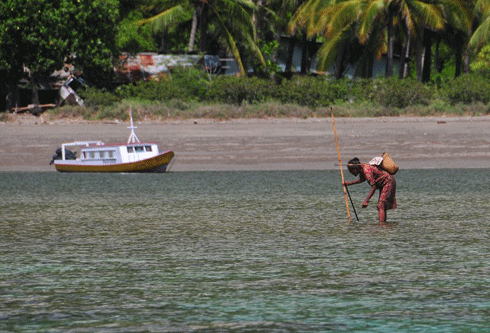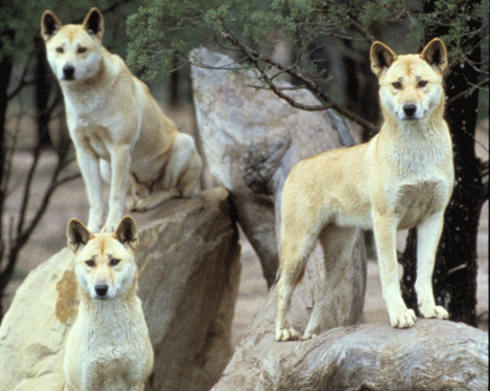Published: 17 December 2012
Make your next holiday a sustainable one
Rosemary Black
It’s holiday time and many of us are heading off overseas, or thinking about where to spend our next vacation. Our choice of destination, accommodation and activities can make a difference to local economies, cultures and environments. Dr Rosemary Black offers some advice on how we can make our holidays more sustainable.

|
|
A local villager foraging for shellfish on Atauro Island. The island, 35 km south of Dili and separated from the Timor-Leste mainland, has a population of 8000 living among five villages. Eco-tourism is a major source of income, supplementing subsistence fishing and farming. Adventure Ecotourism students from Charles Sturt University visited the Tua Koin ecotourism village to study first hand how local people are managing the enterprise sustainably.
|
For developing countries like Fiji, Thailand and Indonesia, tourism is a major source of foreign income and a potentially significant driver for economic growth. So, while we often hear about cases where tourism may have detrimental impacts on the local environment and communities, it can also provide positive benefits.
Sustainable tourism is tourism that is environmentally, economically and socially sustainable – that means its aim is to minimise impact on the environment and communities, and at the same time contribute positively to local communities.
What can you do to ensure that your tourism experiences are sustainable?
The first thing is to realise you are a vital part of the global tourism industry, and you can help transform the way the world travels by being a responsible traveller.
As a tourist or potential tourist, ask yourself ‘am I contributing to the local community or environment?’ Travel can and should be much more than simply visiting places, taking pictures and buying souvenirs; it can inspire cultural awareness, tolerance, and commitment to environmental responsibility.
Try to minimise your impact on communities and the environment. One of the most important things you can do as a responsible traveller is to make informed choices before and during your trip. With a little planning, you can improve the quality of your trip, while making a real difference to the people and places you visit.
When choosing destinations, accommodation and tour operators, consider which ones work to protect the environment and benefit local cultures and communities.
Do your homework, ask questions, seek out quality products by looking for accredited operators, guides and accommodation, and look for opportunities to give something back to the local community or environment – many tourism operators are supporting community projects and offering travellers the opportunity to get involved.
By exploring alternative travel choices, you can have a unique trip and avoid leaving negative marks on cultures, economies, and the environment, while making a positive impact on the people and places you visit.

|
|
Fijian villagers prepare to perform a ceremonial dance for tourists: seeking out genuine cultural experiences is rewarding for both travellers and the local communities.
|
Here are some useful dos and don’ts for your next trip away from The International Ecotourism Society. These are useful for holidays in Australia and overseas.
1. The hotel: Ask about environmental policies and practices. Talk with staff about working conditions. Does the hotel support community projects?
2. Language: Learn a few words of the local language and use them.
3. Dress: Read up on local conventions and dress appropriately. In many countries, modest dress is important.
4. Behaviour: Be respectful of local citizens’ privacy. Ask permission before entering sacred places, homes, or private land.
5. Photos: Be sensitive to when and where you take photos/video of people. Always ask first.
6. Environment: Respect the natural environment. Never touch or harass animals. Always follow designated trails. Support conservation by paying entrance fees to parks and protected sites.
7. Animal products: Never buy crafts or products made from protected or endangered animals.
8. Pay the fair price: Don’t engage in overly aggressive bargaining for souvenirs. Don’t short-change on tips for services.
9. Buy local: Choose locally owned lodges, hotels, and B&Bs. Use local buses, car rental agencies, and airlines. Eat in local restaurants, shop in local markets, and attend local festivals/events.
10. Hire local guides: Enrich your experience and support the local economy. Ask guides if they are licensed and live locally. Are they recommended by tour operators?
A book I recently co-edited explores the issues of how sustainable tourism can provide positive benefits to local people and the environment in developing countries.
Sustainable Tourism and the United Nations’ Millennium Development Goals: Effecting Positive Change
brings together research and examples from around the world of sustainable tourism initiatives.
The UN Millennium Development Goals focus on trying to address global issues like poverty alleviation, primary health care and education for all, environmental sustainability and gender equity. We used this as a framework for the book and explored how sustainable tourism can help support and meet the goals.
We didn’t only have academics writing chapters but sought out local people who actually run sustainable tourism operations in places like Nepal, Costa Rica, Fiji and Indonesia.
I think this book has an important message for tourists from developed countries such as Australia who travel overseas to enjoy the different culture and environment of a developing country – that they can play an important role as responsible tourists and that tourism can help support the health and well-being of local people, assist biodiversity conservation efforts, and preserve local cultural heritage, while also supporting education, equal opportunities for women and basic human rights.
Dr Rosemary Black is a senior lecturer and social researcher in the School of Environmental Sciences at Charles Sturt University specialising in sustainable tourism, heritage interpretation, outdoor recreation and tour guiding. Rosemary previously worked as a park ranger in NSW and adventure travel guide in Nepal, India, China, Tibet and Australia. This is a lightly edited version of an article first published in Open Forum, an independent, non-profit think-tank built around a community blog moderated by Global Access Partners (GAP).






